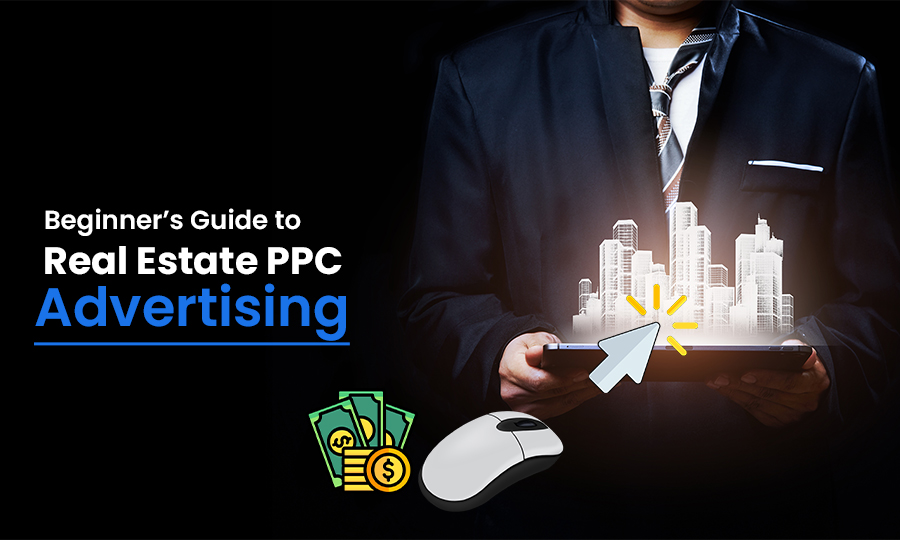Being one of the most powerful and outcome-oriented forms of digital marketing, Pay Per Click (PPC) claimed its wide acceptance among the majority of marketers. As per stats, the largest share of the advertising market at 39.8%. It caters to multiple industries by providing them with a plethora of growth opportunities – real estate is one of those. PPC for real estate offers fast results.
PPC provides a fully targeted approach for the real estate industry for reaching potential house buyers and also more motivated sellers. It’s an important method that ensures your complete marketing strategy and works perfectly. It promotes your business and thus helps you attract individuals looking for the top real estate solutions.
Running ads for real estate can be clumsy, especially for beginners as it requires a sound knowledge and holistic approach. In this post, we will discuss a complete guide for beginners to run real estate pay per click advertising without any hustle.
What is Real Estate Advertising?
Real estate PPC advertising is the most popular form of digital marketing technique where most industry-related businesses pay a fee every time their advertisements are clicked. It’s the most reliable technique of buying visits to your real estate website. The Google adwords boosts targeted traffic to agent websites, traffic to listings, specific real estate services, and more.
These advertisements are visible in various places including good websites, search engines, and social media platforms. Real estate online advertising are effective since they enable precise targeting based on various factors like demographics, location, user behaviors, and more. For instance, a real estate agent creates advertisements targeting potential home buyers looking for properties in a fully specific neighborhood.
What Are the Benefits of Real Estate PPC Advertising?
Pay per click advertising for real estate offers a plethora of benefits, whether it’s precise targeting, measurable returns, or others. Let’s discuss some of these benefits in detail.
Cost Effective
Cost-effectiveness is one of the major advantages of Google ads campaigns. It lets you pay only when someone clicks on your ad. It means every single penny you spend is associated with user interaction. This is a perfect option for real estate professionals who seek to optimize their marketing budget.
Deliver Fast and Measurable Outcomes
Being a time-sensitive industry, real estate requires quick nurturing and also generating high quality and new leads to sell fast – PPC for real estate helps in this. The Google ads campaign produces near-instant visibility and outcomes. Once your ad goes live, it starts appearing in the targeted locations whether it’s search engines or other places. It helps you in the following ways;
- It quickly boosts traffic to new listings.
- It focuses on time-bound offers
- It creates a pipeline momentum for new developments.
Targeted Advertising
Real estate pay per click advertising ensures outstandingly granular targeting, which ensures your advertisements are reflected to the most relevant customers. You can consider the following important parameters by keeping in mind several important factors;
- Demographics
- Location
- Device
- Search intent
This kind of precision allows your budget to be spent reaching those who look actively to purchase, consult, or seek real estate investing. It lessens irrelevant impressions and thus increases the overall chance of turning clicks into conversions.
Boost Brand Visibility
Since PPC for real estate ads are visible at the top of the organic search results, they thus boost brand exposure even if users don’t click on it. A higher SERP position reflects that when users don’t convert right away, your brand messages and brand names are easily visible to your right audience.
With time, it creates great trust and familiarity. Apart from this, many platforms including Facebook Ads and Google Display Network ensure visual display formats, where you can reflect various points;
- Virtual tours
- Top-quality images of real estate
- Brand logos
- CTAs
Localized Marketing
Real estate is one of those industries that target customers locally. And no other campaign is as effective as pay per click advertising when it comes to targeting customers locally. Whether you promote a new apartment project in New York or office spaces in Boston, you need specific regions or even within a defined radius. It helps minimize marketing wasted spend and thus keeps your messages fully emphasized to many potential tenants and buyers in your service area.
Campaign Control
Real estate professionals often run a large number of campaigns for multiple properties, time frames, or right audience types. PPC for real estate offers full control in terms of when, how, and also where your advertisements are reflected.
You get the following important options;
- Adjust bidding strategies according to competition or seasonality
- Restart or pause your campaign quickly
- Customize ad extensions with maps, call buttons, site links, etc.
- Split-test ad variation and landing pages
This control ensures agile marketing execution. For instance, when a listing gets sold, you can shift your budget fast to many other live properties.
Flexible Budgeting
Whether you run a large brokerage firm or work as an independent real estate agent, pay per click advertising can be tailored perfectly to match your budget. You can even start small, spend less amount ($10), and can increase the maximum amount with better performance.
Apart from this, real estate professionals also run many project-based or seasonal campaigns with certain specific budget caps, which ensure complete financial control. With the performance improvements, it’s indeed convenient to increase your budget on winning Google ads and target more geographic locations.
Who Can Use Real Estate PPC Advertising?
Whether it’s real marketing firms or property management, they can directly get benefits through pay per click advertising in terms of luring property owners, tenants, and new clients. Let’s understand who can use this campaign;
- Real Estate Developers
Real estate developers run pay-per-click campaigns especially to promote their new projects and developments. It helps them target potential buyers with advertisements that reflect new properties to drive sales and interest. PPC for real estate is also a great step in the sales funnel, which helps them nurture the many potential customers they acquire with the help of campaigns.
- Real Estate Agents and Brokers
Real estate agents can boost their visibility in various specific local marketing by targeting several specific and best keywords. These keywords are directly related to their area and also for more leads generation by directing traffic to landing pages with home valuation tools and contact forms.
- Real Estate Agencies
Larger real estate agencies can also harness the potential advantages of pay per click advertising when it comes to creating brand recognition and a powerful online presence. While entering new markets or also promoting various new services. They can also leverage PPC to boost traffic to their property listings.
- Real Estate Investors
Real estate investors can create and design their pay per click advertising to entice homeowners who are keen to sell their property. It brings huge investment opportunities for them as well. Besides, they also use this campaign for market research, which gathers valuable data on where to focus mainly on investment efforts.
- Property Management Companies
Many property management companies most frequently use PPC advertisements. It helps the gain the attention of tenants by targeting people searching for rental properties in many specific region. They can also focus on property owners who seek to look for professional management solutions.
- Home Builders
Home builders harness PPC advertising to boost traffic to their model homes and also many new developments. These attract people searching for newly constructed homes. Those builders who provide custom home-building services can easily target individuals who are keen on creating a new home, which reflects their capabilities and portfolio.
How to Create PPC for Real Estate
Creating a PPC campaign for real estate is a process that involves multiple steps. Each step serves its unique purpose. Let’s discuss every step in detail;
- Define Goal First
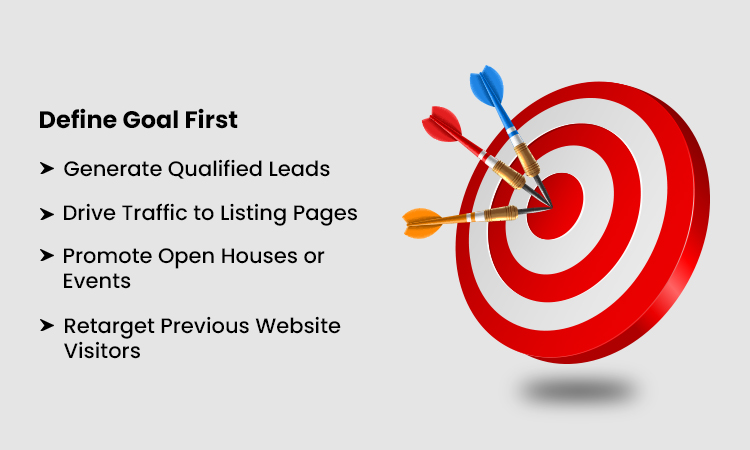
This is the first step of setting up any PPC campaign. The reason is it’s impossible to know whether your efforts pay off without a clear objective.
- Know your Major Goal
You need to be clear about the most crucial outcome you seek. You need to decide whether you wish to generating leads, more phone calls, or higher website traffic. No matter what you need, you should be specific. For instance, you may decide on a goal like “Maximize your website visit by 40% within 1 month.”
- Break Down your Goal into Small
You can break down your goal into small and measurable pieces. For instance, if your main objective is to get 60 more leads, you need to determine the number of clicks you require and also how much you desire to pay per click.
- Set a Timeline
You need to ensure your objective has a clear deadline. You need to set a monthly or weekly timeline. It helps you keep yourself accountable and also enables you to measure your progress.
- Align Objectives with Budgets
Make sure your goal aligns perfectly with your budget. For instance, if you desire 50 PPC leads, you need to be ready to spend at least $250 as an average CPC is $5. Make sure your objectives are realistic for your budget.
- Track and Make Necessary Adjustments
Once you set a clear objective, you need to ensure to track your performance with the use of tracking tools of Google Ads. If you don’t achieve your targets, you need to adjust your bidding strategies, keywords, ad copy, etc.
- Know your Target Audience

The next thing you need to do is to be familiar with your target audience, which is necessary to ensure the success of your PPC campaign. In other words, you need to be aware of whom you wish to reach actually, whether it’s people seeking to sell, first-time home buyers, or renters.
Once you know your target audience, you can tailor your advertisements easily. You can use various important factors to do it, including location, demographics, behaviors, interests, etc. These help you narrow your audience.
You can make your ad more relevant by being more specific. It prevents you from wasting your budget on those clicks that have less potential to convert.
- Conduct a Thorough Keyword Research
A thorough research is quite essential to run your PPC campaign successfully. It ensures your ad appears when users search for your offerings. The relevant keywords indicate you generate high-quality leads and don’t waste money.
For PPC keyword research, you can leverage none other than ‘Google Keyword Planner’. This tool not only gives you the best keyword ideas based on your input but also provides CPC, apart from search volumes and many other details.
In the Keyword Planner tool, we put the term “Commercial Space in New York”.
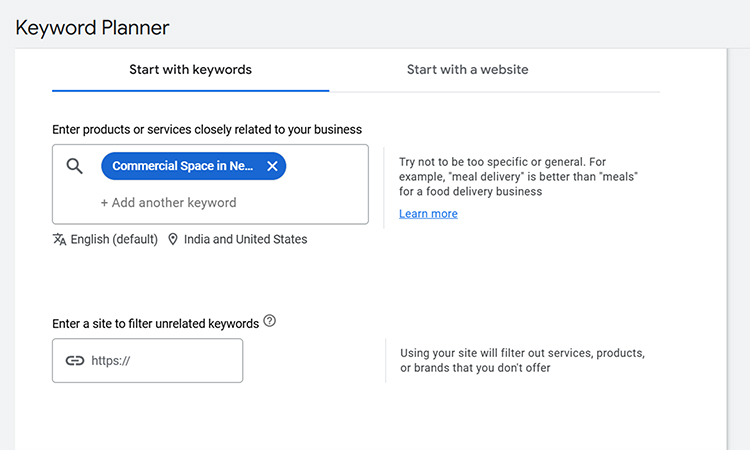
After inserting the search term, the result appears with a few keywords as follows.
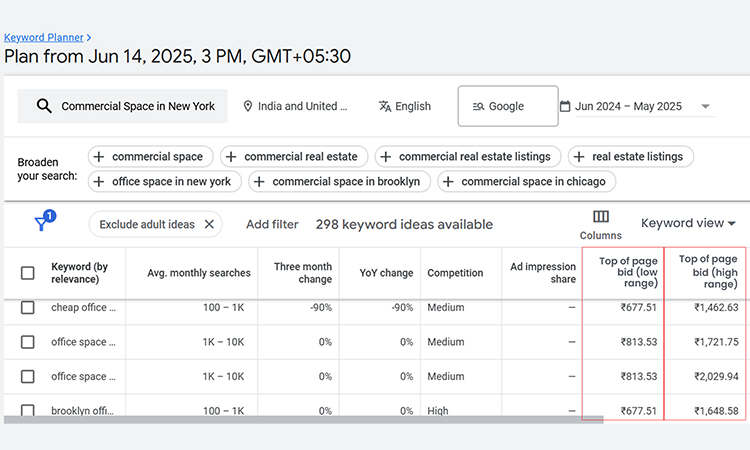
In the above result, you can visualize many suggested keywords along with their average monthly searches, competition, and lowest/highest bidding range. It helps you select the right keywords to run your campaign based on their spending capacity.
- Create Campaigns
When you access your Google Ads account, you need to tap “Blue Plus Sign” to create a new campaign.
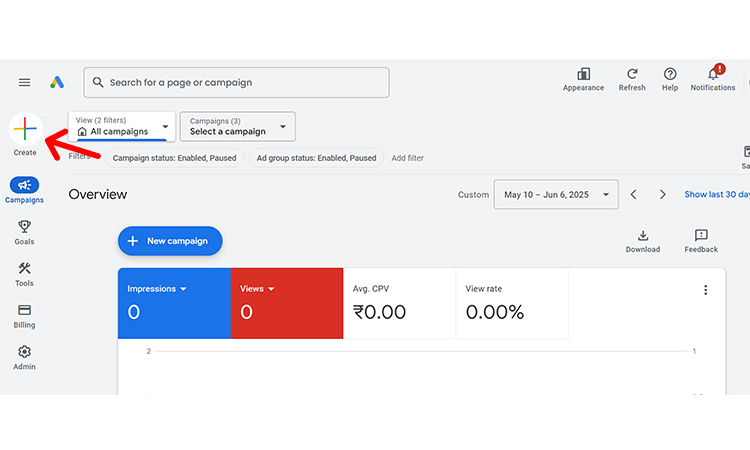
Once you create a new campaign, you will now get an option to select the right type of campaign and objective. It’s advisable to select the right type of campaign that aligns perfectly with your business objectives since you generally boost visitors to your website. Following are the options you will come across while selecting your campaign objectives;
- Sales
- Leads
- Website Traffic
- App Promotion
- Awareness and Consideration
- Local Store Visits and Promotions
- Create a Campaign without Guidance
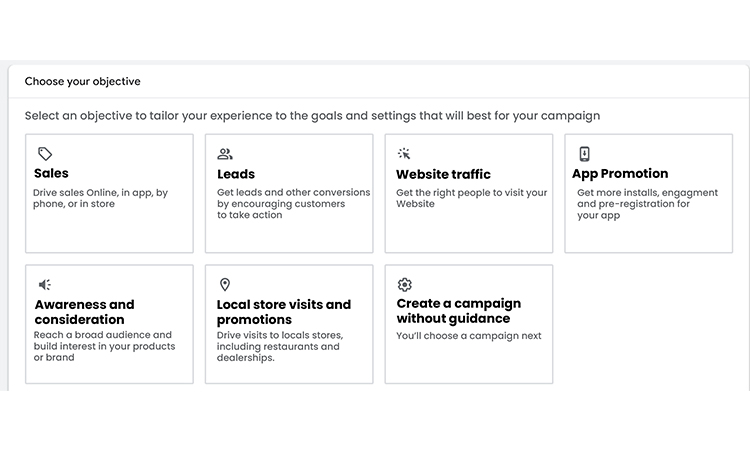
These objectives indicate to Google what you wish to accomplish with your campaigns. It also provides real estate businesses the capability of determining and optimizing their advertisements for the best possible outcomes.
- Select the Right Campaign Type
The most important thing is that you can select the most appropriate campaign type that determines where your ads are visible. If you wish your ads to appear in Google’s SERPs, you need to opt for ‘Search Campaign’.
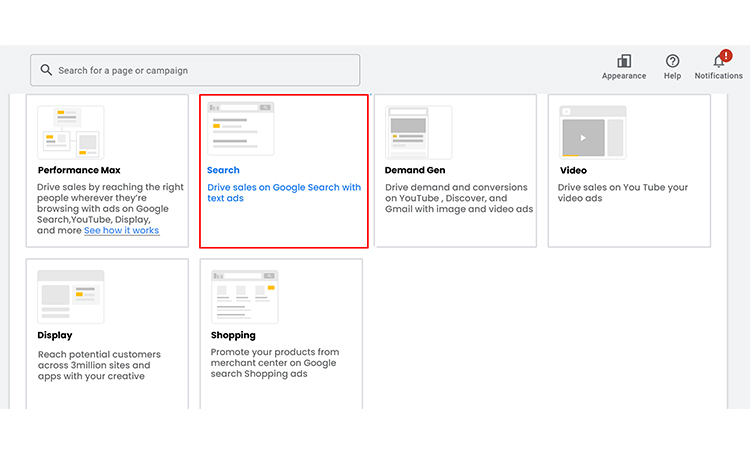
- Name your Campaign
The next important step you need to go through is to name your campaign. Make sure you select your campaign name based on your objective. For instance, you can name something like “Los Angeles – Search”. It would indeed be a great name going off your previous examples.
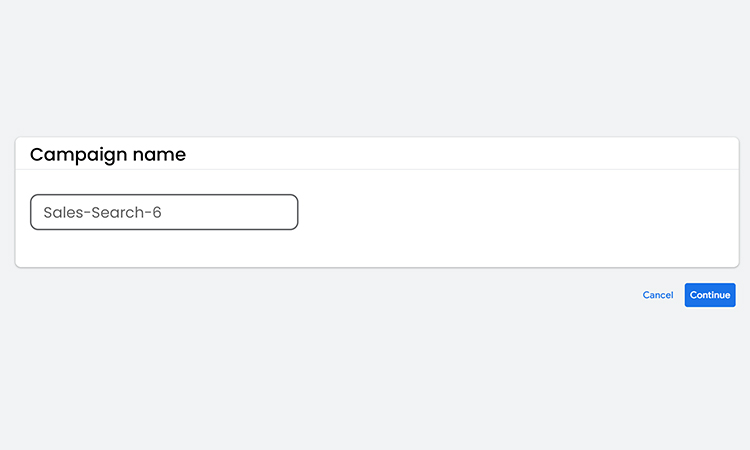
- Target Location
Now, it’s time for location targeting where you wish to enter those cities you wish to target. Google also shows your ads by default to those people who are interested in your targeted locations.
It reflects your advertisements will appear to anyone who looks for your keywords irrespective of location. Meanwhile, these locations offer data where people click your ads.
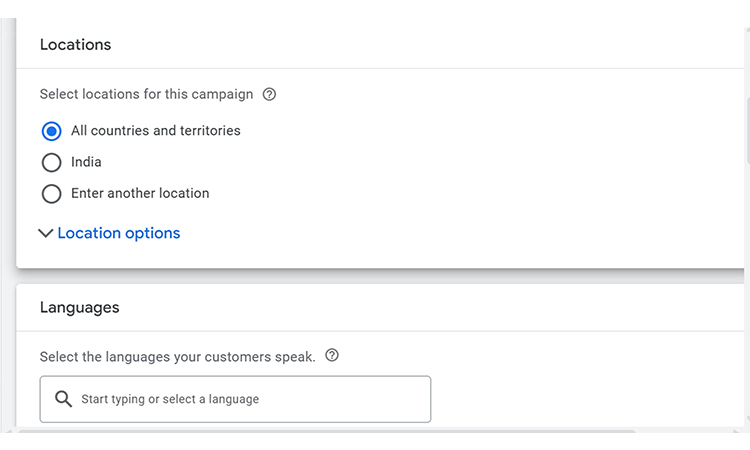
- Create Audience Segmentation
Creating audience segmentation is quite essential to hyper-focus on Google’s in-market audiences. They are consumers who actively research products or services and also consider purchasing something.
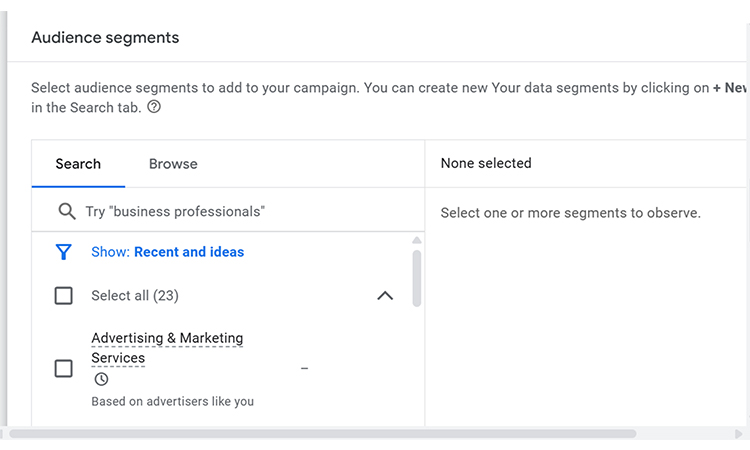
You need to search for “real estate” and choose in-market audiences that include a “For Sale” label. In case, it’s appropriate for your business, you can also target “Homeowner”, “Commercial”, “For Rent”, and other categories.
- Set Budget
Budget is highly important while creating a campaign setup. This is something that depends on your requirements or also industry seasonality. Therefore, you can set whatever is comfortable for your organization. With Google Ads, you will come across a range of bidding strategies that are as follows;
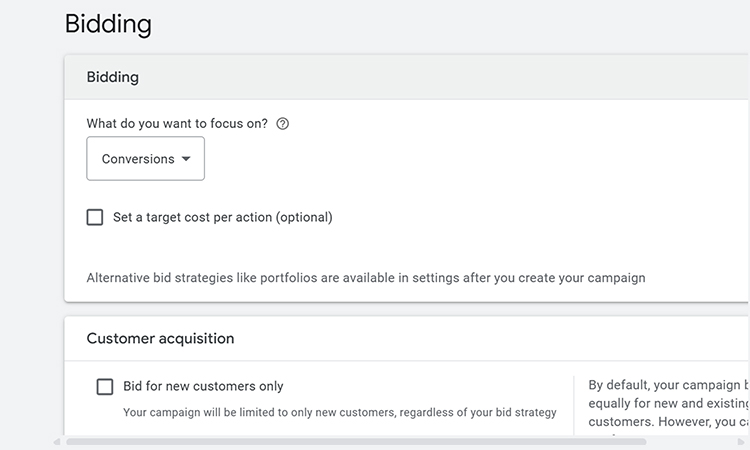
Increasing Conversions
It’s an important bidding strategy that automates bid settings to facilitate you to get higher conversions based on your daily budget.
Maximizing Clicks
It’s another automated bidding strategy that lets you get more clicks as much as possible with the use of your day-to-day budget.
Cost Per Acquisition
It’s one of the most preferred strategies. In this, you can set a bid to help get as many conversions as possible at the target CPA based on your setting.
- Create a Landing Page For Conversion
Creating a landing page is another important step that helps you convert visitors into potential buyers. In case, your landing page doesn’t align perfectly with your ad’s promise, you are more likely to lose your potential clients. Make sure your landing page is fully focused and clear, and guide visitors while taking action.
Tips to Create a Conversion-Oriented Landing Page
While creating a landing page for your PPC campaign in real estate, you need to consider the following important points;
- Define your objective clearly
- Write an eye-catchy headline
- Create a powerful subheadline
- Include a lead capture form
- Display Unique Selling Points (USPs)
- Use quality visuals
- Include various trust signals
- Use geo-specific info
- Use local keywords
- Mobile Optimization
- Keep Eyes on Conversion
Tracking your PPC campaign progress is equally important as it gives you a complete understanding, especially when your campaigns work and also the right scope for improvements.
Without tracking PPC data, you will not be able to know whether you get the top return on your investment or also those areas you need adjustments. You can leverage various Adwords reporting tools to determine important metrics such as expected click-through rates, conversions, cost per conversion, and more. It thus helps you make a decision based on data.
Let’s explore some of the top Adword reporting tools you can consider to leverage for your campaign.
- Google Ads Built-in Reports
- DashThis
- AgencyAnalytics
- Whatagraph
- Klipfolio
- Zoho Reports
- Databox
- Supermetrics
Most Popular Ad Formats for Real Estate
It’s important to choose the right type of ad format in the real estate industry to improve the efficiency of your campaign – it has a direct impact on return on investment (ROI). Let’s explain some of the most sought-after PPC platforms.
- Display Ads
When it comes to display ads, these are an important type of visual ads that are visible within the Google Display Network. Be it animations, images, or texts, they include everything. Display advertisements are outstanding for retargeting and also for creating brand awareness. These forms of advertisements help you reach your potential clients since they browse the web.
Benefits:
- Visually engaging
- Retargeting
- Measurable performance
- Perform for multi-device strategy
- Search Ads
A report reveals that companies are likely to spend on search ads up to $351.55bn in 2025. Being a text-based advertisement, search ads appear in SERPs, when users Google the related search terms. They are indeed effective at getting intent-driven traffic and also targeting those users who actively search for particular real-estate-related terms. This type of Google ad is available with a short description, URL, headline, etc. It’s improved with ad extensions like call buttons, site links, location information, etc. to maximize visibility and engagement.
Benefits:
- High-intent targeting
- Budget control
- Increased brand awareness
- Local and mobile reach
- Video Ads
Video ads are indeed dynamic ads and engaging that are visible on many platforms such as Facebook, YouTube, Instagram, and others. They are robust for storytelling and also demonstrating property features. It offers an immersive experience compared to image or text-based ads.
Benefits:
- Higher brand recall
- Improved SEO ranking
- Visibility across platforms
- Improved conversion rates
- Gmail Ads
Gmail ads are visible in the “Social Tabs” and “Promotions Tabs” in Gmail inboxes. It blends perfectly with your regular mail. They expand perfectly when users click and then open a complete real estate ad format. It includes various important elements such as videos, images, call-to-action buttons, etc.
Benefits:
- Highly targeted reach
- Robust remarketing capabilities
- Higher engagement potentials
- Non-disruptive formats
Top Tools to Use for Real Estate PPC Campaign
To run a PPC campaign for your real estate business, you need to leverage robust tools. Using these tools helps you target the right audience and thus helps you meet your core marketing objectives easily. We discuss some of the most effective tools that are as follows;
- Ahrefs
Being one of the well-known tools, Ahrefs is the right option for competitor analysis, keyword research, etc. It provides real estate professionals with a range of features to boost their PPC campaigns. It has enormous capabilities of letting you uncover low-competition keywords, high traffic, etc.
These boost targeted traffic to your advertisements. You need to select the right keywords for result-driven campaigns focused on your targeted audience.
Features:
- Offer detailed insights
- Identify gaps and opportunities
- Backlink analysis
- Discover potential link-building opportunities
- Content research
- Track your website performance
- Google Ads
Google ads are one of the most robust platforms that help you create and manage your PPC campaigns. It allows you to bid on various keywords that are relevant to the market, which is important for the visibility of your ads on the top of SERPs.
It facilitates geographic targeting that enables you to target a specific location for your ad. Whether you wish to target your neighborhood, any particular city, or even the radius around your business, Google ads ensure your ads reach the most relevant audience.
Features:
- Geographical targeting
- Ad extensions
- Analytics and reporting tools
- Remarketing
- SEMrush
SEMrush is another powerful tool that allows real estate professionals to manage PPC campaigns effectively. It includes several extensive features like competitor analysis, keyword research, site auditing, A/B testing, and performance tracking.
SEMrush is packed with all the necessary tools to create a performance-driven PPC campaign. It helps you identify the right keywords for your PPC campaign based on Keyword Difficulty (KD), search volume, etc.
Features:
- Competitor analysis
- Audit tools
- Track important metrics
- A/B testing for ads
- Google Analytics
With Google Analytics, you can get a complete overview of the overall performance of your campaigns. It provides an in-depth view in terms of the way users interact and engage with your website. The tool offers you a detailed insight into user behavior, including vital metrics like pages per session, session duration, bounce rates, and more. Once you get a complete understanding of user behaviors, you can easily discover various aspects of your website and also the scope for improvement.
Features:
- Track conversion rate
- Track CTR
- Track Cost Per Acquisition (CPC)
- Track Return on Investment (ROI)
Latest Trends in PPC Real Estate
Whether it’s frequently changing customer behavior or fast-paced technological advancements, many factors are responsible for the evolution of PPC advertising. So, it’s crucial to know for real estate marketers about ongoing trends that impact heavily on this campaign. Let’s explore some of them;
- Video PPC
When it comes to video, it’s popularly termed as king in today’s digital space. Many platforms such as Facebook, YouTube, Instagram, and others support video ads that reflect neighborhood overviews, property walkthroughs, agent introductions, and more. These ads have an immense capability of creating an emotional connection and enabling prospects to visualize homes even before visiting.
Short-form videos are highly effective on mobile and also on platforms that offer precise targeting according to interest, demographics, and behavior. To make your video ads more effective, you need to integrate various top elements such as location pins, CTAs, lead forms, etc.
- Hyperlocal Targeting through AI
Broad geo-targeting is not relevant anymore. Today, real estate PPC harnesses the potential advantages of AI-driven tools to provide hyperlocal ads, which target users with neighborhoods, specific zip codes, streets, and more.
Be it search intent, user behavior, or local trends, AI can analyze everything. For instance, a real estate agent gets the capability of targeting ads to those people even within a 1-mile radius, especially for those of newly listed properties. It minimizes ad wastage and also maximizes ROI.
- Smart Bidding through AI
Artificial Intelligence leverages real-time data, including location, device type, user intent, time of day, and more. These factors adjust bidding automatically for various highest possible conversion rates. For real estate PPC, it indicates bidding higher when users look actively for homes or when inventory is low and also competition is huge. Whether it’s target CPA, enhanced CPC, or increased conversion, these look for becoming smarter and also higher efficiency with Machine Learning (ML).
- Lead Forms
Lead generation is something that is of great importance. It’s a lifeline of real estate marketing. Be it Facebook or Google, these platforms support mainly native lead forms that are directly related with PPC ads. It allows users to express interest even without leaving the ad platform, which minimizes friction and also increases conversion rates as well.
These forms are highly important and can also auto-fill user details such as email, name, sync, and contact details with CRM tools for quick follow-up. They are highly effective on mobile, where traditional landing pages may cause drop-offs.
- Voice Search Optimization
Voice search has become the most popular trend in today’s time in terms of the way it influences the way users find real estate. Instead of typing texts, buyers need to ask “4BHK apartment in New York”.
To capture it perfectly, PPC campaigns need to use natural language keywords and also various long-tail queries that align perfectly with conversation search. Whether it’s PPC strategies or local SEO, they blend perfectly with voice-friendly ad copy and also structure data that plays an important role in visibility.
- Local Service Ads (LSAs)
Local service ads have become an important thing for many real estate professionals. These ads are visible at the top of Google searches and highlight verified local agents and traditional PPC ads. LSA works on a pay-per-lead model rather than PPC.
It helps marketers pay only when a qualified lead reaches out. Google performs the verification of background checks and licenses perfectly to create trust. Besides, “Google Guaranteed” badges boost credibility. LSAs provide an outstanding way of dominating hyperlocal visibility with huge trust for both agents and brokers.
- Integration with Real Estate Platforms
Marketers get the facility to integrate PPC campaigns with many leading real estate platforms such as Realtor.com, Zillow, and more. These platforms ensure sync of lead tracking, ad campaigns, analytics, and retargeting.
One can run display ads targeting users who visit specific property listings or also automate various retargeting ads for users who seek an abandoned lead form. A smooth integration is necessary to ensure ad spending directly translates into leads and conversions.
Common Mistakes to Avoid in Real Estate PPC
Though PPC has a vast potential to take your real estate business to the next level, you can avail yourself of all those benefits only by running ads successfully. We explain various mistakes that you need to avoid for a real estate PPC campaign;
- Not Using Negative Keywords
Most marketers ignore negative keywords while running PPC campaigns. And this is one of the biggest mistakes they commit. Without using these keywords, your ads may not be visible for those of irrelevant searches such as “cheap office rentals” or “free apartments”.
These lead to poor-quality clicks that drain your budget fast. Use these keywords to exclude those terms that don’t match your target audience or intent. For instance, if you sell luxury homes, you need to exclude keywords such as “low-cost”.
- Avoid Location Targeting
The real estate business is indeed location-specific. It’s advisable to avoid proper location targeting that results in wasted spend on users outside your service location. If your business is located in California, you can target the same location. The most important thing you need to ensure that campaign settings indicate precise geo-targeting.
- Creating Poor Ad Copy
You need to take into account that first impression makes the last and thus help you leads generation for your business. Whether generic, vague, or misleading content, they are not capable of generating clicks. These are things that lure the wrong ones.
It’s advisable to avoid keyword stuffing. You can also emphasize benefit-driven and clear messaging such as “3BHK Flats in Boston – Starting prices $150,000. Never fail to include a call to action that grabs attention, such as “Schedule a Consultation Now.”
- Avoiding Mobile Optimization
You need to take into account that almost half of real estate searches take place on mobile devices. So, when you neglect continuous optimization for mobile, it results in poor user experience and also lost leads. It also impacts negatively on lead quality. Make sure your website loads fast on mobile, and your forms are easy to fill.
- Avoiding Landing Pages
Most marketers send users to the home page rather than their landing page. It’s another big mistake they commit. A perfectly optimized landing page needs to match the ad intent and offer a smooth experience that leads to conversion.
For instance, when your ads promote a 3BHK flat in Los Angeles, your landing page needs to reflect the exact listing accompanied by prices. It should also include a contact form, images, and more.
- Lack of Retargeting
When you ignore retargeting, it indicates you lose out on warm leads that expressed your interest. You can implement your social media retargeting and display marketing for re-engaging users who visit your websites but don’t convert. These ads work as a reminder and thus maximize the conversion possibilities with time.
- Mismanage Budget
The mismanaged budget makes a real estate campaign more expensive. Whether you underfund high-performing campaigns or overbid on broad keywords, it can burn your budget fast. It is crucial to keep an eye on various important things including keyword performance and thus adjust your budget according to conversion data. You can control your ad spending easily by implementing budget caps.
- Avoiding A/B Testing
Real estate PPC marketers believe that one version of a landing page or ad always performs outstandingly. If you also think the same, you overcome this thinking. A/B testing is the right way to compare variations such as images, CTAs, layouts, and more.
They help you find out the things that boost conversion. You need to conduct testing regularly and thus fine tune your ad iteratively. It indeed works effectively to ensure a better performance of your ads.
How to Select the Right PPC Company for Real Estate?
Choosing a reliable PPC company is indeed highly important for real estate as they ensure the success of your campaign. So, you need to consider the following important factors while making selection of the right company;
- Check industry expertise
- Check their experience
- Check case studies, client testimonials
- Transparency in reporting and communication
- Ability to align with your business goals
Conclusion
With Google Ads, real estate experts can grab a golden chance to scale their business easily. You need to sketch out a good strategy when it comes to creating, managing, and optimizing your Google Ads account.
It’s indeed a must-do step when it comes to owning your lead source instead of depending on purchasing leads or also waiting for your cell phone to ring. You can use the above real estate PPC guide while creating your campaign, reviewing it, and fine tune your ad campaigns. To gain better outcomes, it’s vital to get in touch with Google ads services to get the guaranteed results along with more deals and discounts.
Additional Resources:
- SEO for Real Estate: A Step-by-Step Blueprint to Higher Rankings
- 7 Ways to Use Social Media Marketing for Real Estate: Get New Clients

